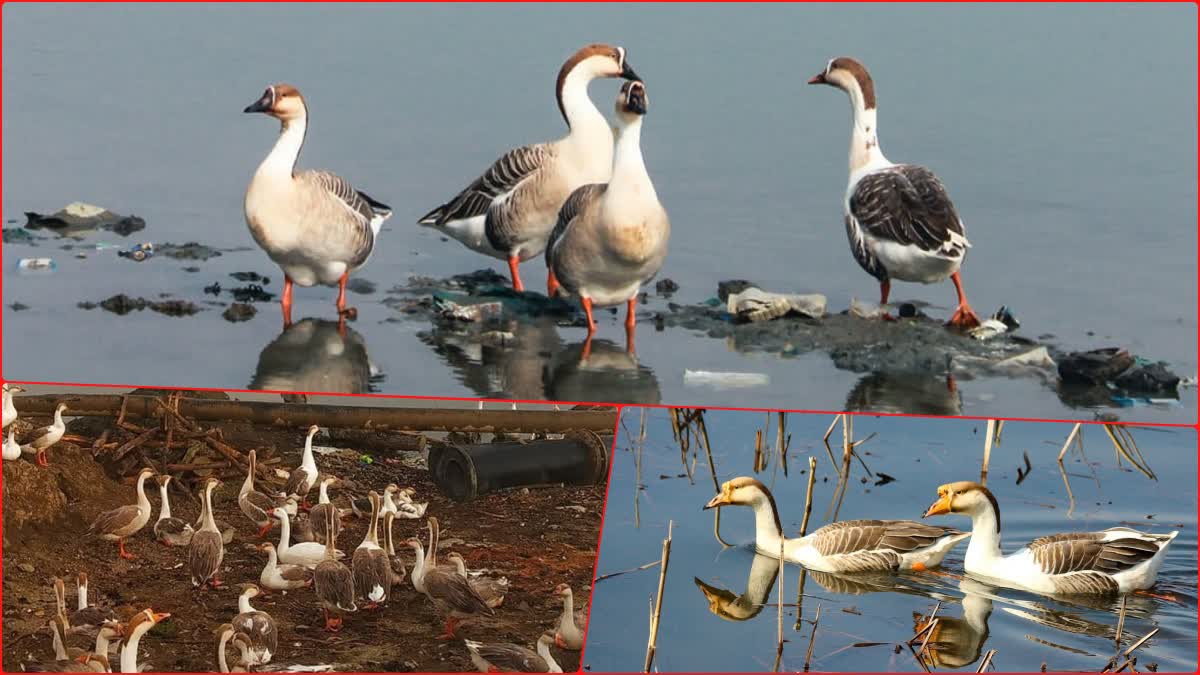Srinagar: South Asia's largest freshwater lake—Wular—witnessed a tragic incident recently after thousands of Kashmir's native geese, locally known as ‘Kashur Aenz', were found mysteriously dead in and along the banks of the water body. The sudden and untimely deaths have triggered concern among wildlife experts, officials, and conservationists in Jammu and Kashmir.
“We received reports of Kashur Aenz dying mysteriously at Wular Lake,” said Irfan Jeelani, an ornithologist and founder of the ‘Birds of Kashmir’ group. “We rushed to the site, especially since this is the peak time for migratory birds arriving in Kashmir.”
After examining the deceased and ailing birds, certain signs and symptoms pointed towards Ranikhet or Newcastle disease (NDV), Jeelani said.
“Some of the signs which were found in these birds include swollen eyes, drooping of the head and neck, watery diarrhoea, and loss of coordination,” he told ETV Bharat.
Ranikhet, or Newcastle disease (NDV), is a viral infection that affects geese but spares other bird species, such as ducks, that frequent the lake.
“The greylag goose, a common winter visitor, has yet to arrive here, which makes a viral from outside unlikely,” Jeelani said, urging the need for vaccinations to prevent the disease from spreading further as such cases were reported last year too.
Dr GA Lone, Chief of the Animal Husbandry Department in Bandipora, also corroborated the observations by Jeelani, saying “the initial probe by his team also pointed to Ranikhet disease.” He said the department would expand the jurisdiction of the investigation to get clarity on the instances.
Other officials said the possibility of avian botulism couldn’t be ruled out and would be clear after investigation reports come. However, they stressed that bird flu is unlikely, with no signs of cross-species infection detected so far.
“Our department has taken immediate steps, including arranging vaccines and medications to treat the infected birds. Last year, people also found dead geese in Saderkotte Payeen village. We are monitoring the situation closely," said Lone.
“There was no need to panic, as no migratory birds have been affected yet, and there are no mortality reports from other nearby areas,” he said.
Wular Lake is situated in Bandipora and is an important habitat for many migratory birds in winter. It is also home to a variety of birds, from waterfowl like shoveller and mallard to the endangered Pallas's Fish Eagle. The lake draws lakhs of migratory birds each winter, with last year's numbers reaching approximately four lakh.
“This year, we expect even more,” noted an official from the Wular Conservation & Management Authority (WLCA). “A Great Bittern was also sighted here for the first time earlier this month, which is an exciting addition.”
Meanwhile, the latest discovery of mass deaths of Kashmiri geese has prompted officials to initiate a detailed investigation. “Sample collections are underway, with results expected soon,” said WLCA officials.
Adding to the significance, they said Kashur Aenz was officially recognised in 2022 by the Indian Council of Agricultural Research (ICAR) as the only known domestic goose breed native to India. The committee recorded two distinct strains within Kashmir: the white Safed Aenz, prevalent in Ganderbal, and the cinnamon-coloured Katchur Aenz, commonly found in Bandipora and Baramulla. These birds are cherished locally and seen in mixed flocks in Srinagar and Budgam.
Read More



